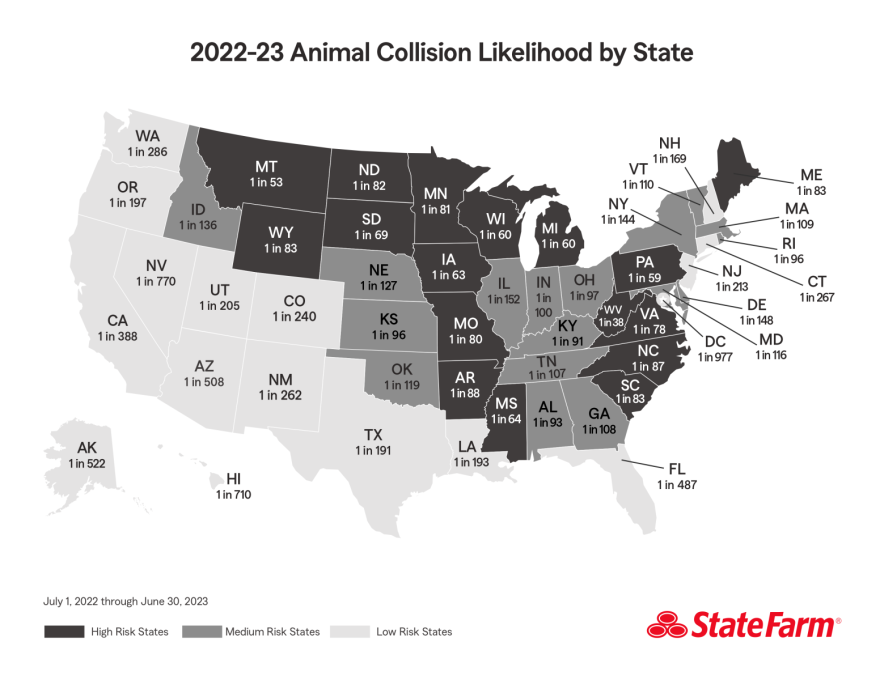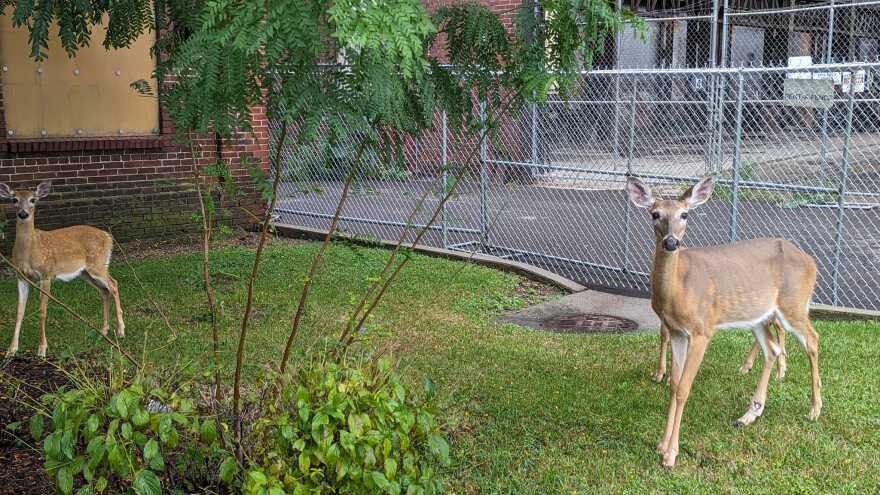- A new report shows Pennsylvania is tops in the country for animal-vehicle collisions
- Additional data counts thousands of accidents directly or indirectly caused by deer
- Lawmakers are proposing wildlife corridors to protect animals and cut down on the number of crashes
BETHLEHEM, Pa. – New data released by the largest insurer of automobiles in the U.S. ranked Pennsylvania tops in the nation for claims filed for animal-vehicle collisions.
State Farm Insurance Co. said 1.8 million auto insurance claims involving animal collisions were filed across the nation between July 1, 2022, and June 30, 2023. Pennsylvanians filed 153,397 of those claims, State Farm said in a release, making it No. 1 in the nation.
The data also ranked Pa. third overall for likelihood of colliding with an animal, with drivers having a 1 in 59 chance of getting into an accident involving wildlife. West Virginia, a neighboring state, ranked No 1.

Heat map focuses on deer collisions
According to PennDOT, there were 5,848 accidents in Pennsylvania in 2022 that were directly or indirectly caused by deer. At least 1,264 people were injured and nine were killed, the data shows.
The data counts vehicular accidents – including 138 in Lehigh County and 125 in Northampton County – in which a deer was struck, or a crash that happened when a driver took evasive action due to deer appearing in the road.
Of those accidents, thousands occurred between the hours of 7 p.m. and 7 a.m., or when lighting conditions were classified as dawn, dusk or dark.
Additional data from the Pennsylvania State Police shows 1,381 crashes involving deer reported from January 1 to June 30, 2023. Those crashes were limited to accident reports taken by troopers and are not indicative of all crashes involving deer across the commonwealth this year.
The most dangerous months for animal collisions
According to State Farm, the most dangerous months for animal collisions are November, October and December, in that order.
The most common scenario to hit wildlife involves driving on a paved, rural road without much traffic when the sky is not quite dark, the insurer said. Results from a survey indicated between 30% and 50% of drivers had accidents during those conditions.
The survey also indicated that just one risky driving behavior, such as speeding or using a cellphone, increased the chance of an animal collision by 23%.

Lawmakers want wildlife corridors
“We know the bleak reality is that every year thousands of animals, including deer, bear, elk, game bird and turtles are killed on Pennsylvania’s roads,” PennEnvironment Conservation advocate Stephanie Wein said in a release.
Wein said the data highlights the urgency of investing in wildlife corridors across the state, calling them a “proven solution for helping to avoid wildlife-vehicular collisions.”
"We know the bleak reality is that every year thousands of animals, including deer, bear, elk, game bird and turtles are killed on Pennsylvania’s roads."Stephanie Wein, PennEnvironment’s Conservation Advocate
Wildlife corridors are defined as habitat linkage that joins two or more areas of wildlife habitat, allowing for fish passage or the movement of plant or animal wildlife from one area to another. According to the U.S. Fish & Wildlife Service, they can span anywhere from a stretch of river to a whole continent.
Earlier this year, the state House passed House Resolution 87, a bipartisan measure to study how wildlife corridors can best be utilized to protect critical animal habitats and keep wildlife off the roads.
“Pennsylvania is a destination for many seeking to take advantage of its vast recreational opportunities,” said Rep. Mary Jo Daley, D-Montgomery, chair of the Pennsylvania House Tourism, Recreation & Economic Development Committee.
“By limiting vehicle-wildlife collisions, these corridors make the roads people take to get here safer while nourishing the flora and fauna that people travel to see,” she said.
Hit a deer? Now what?
Any driver who hits a deer with a vehicle is not required to report the accident to the Pennsylvania Game Commission. But within and around the state's Chronic Wasting Disease Management Areas (DMAs), road-killed deer are routinely picked up for testing.
The Game Commission recently made changes to those areas, including the creation of a new DMA, the expansion of an existing DMA, and reduction of an existing DMA.
When daylight-saving time ends Nov. 6, there will be increased vehicular traffic between dusk and dawn – the peak hours for deer activity – the Game Commission warns. Anyone involved in an accident with injuries should call 911.
Pennsylvania residents may claim the carcass of a road-killed deer. To do so, they can call the Game Commission at 1-833-PGC-HUNT or 1-833-PGC-WILD and a dispatcher will collect information needed to provide a free permit number to the caller.
A resident must call within 24 hours of taking possession of the deer. A passing Pennsylvania motorist also may claim the deer, if the driver whose vehicle hit it doesn’t want it.
If a deer is struck by a vehicle, but not killed, drivers are urged to maintain their distance from the animal. If the deer does not move away from the accident area, or poses a public safety risk, drivers are encouraged to report the incident to the Game Commission or another law enforcement agency.
Drivers are not allowed to intervene after a deer is struck. If the deer must be put down, the Game Commission must be contacted to direct the proper person to euthanize the animal.


